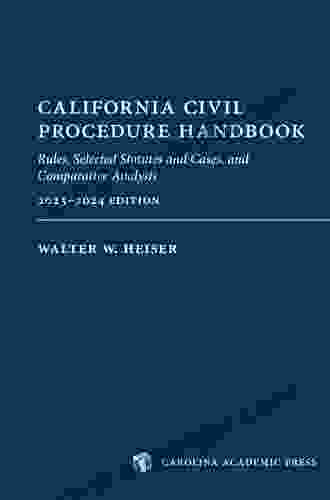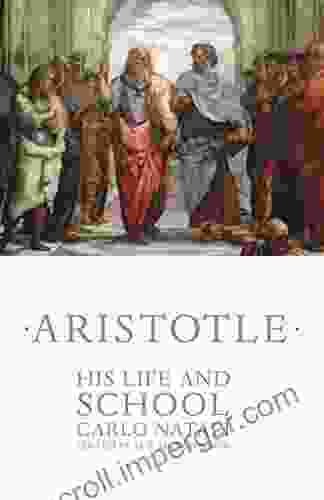Aristotle: His Life and School - An Introduction to the Great Philosopher

4 out of 5
| Language | : | English |
| File size | : | 2940 KB |
| Text-to-Speech | : | Enabled |
| Screen Reader | : | Supported |
| Enhanced typesetting | : | Enabled |
| Word Wise | : | Enabled |
| Print length | : | 236 pages |
Aristotle was one of the most influential philosophers of all time. His work has had a profound impact on Western thought, and his ideas continue to be studied and debated today.
Aristotle was born in Stagira, Greece, in 384 BC. His father was a physician, and Aristotle received a good education in the sciences and philosophy. At the age of 17, he went to Athens to study at Plato's Academy.
Aristotle studied at the Academy for 20 years. During this time, he became one of Plato's most trusted students. However, Aristotle did not always agree with Plato's philosophy. He eventually left the Academy and founded his own school, the Lyceum.
The Lyceum was a center for philosophical research and teaching. Aristotle taught a wide range of subjects, including logic, physics, metaphysics, ethics, and politics. He also wrote a number of important works, including the Nicomachean Ethics, the Politics, and the Metaphysics.
Aristotle's philosophy is often characterized as "scientific." He believed that the best way to understand the world was to observe it carefully and to reason logically about what we observe. Aristotle also believed that the goal of human life is happiness, and that happiness can be achieved by living a virtuous life.
Aristotle's work has had a profound impact on Western thought. His ideas have influenced philosophers, scientists, and theologians for centuries. Today, Aristotle is still considered one of the greatest philosophers of all time.
Aristotle's Life
Aristotle was born in Stagira, Greece, in 384 BC. His father, Nicomachus, was a physician to the king of Macedon. Aristotle's mother, Phaestis, was a descendant of the philosopher Anaxagoras.
Aristotle's father died when he was young, and he was raised by his uncle, Proxenus. Proxenus was a wealthy man, and he provided Aristotle with a good education. Aristotle studied at the Academy in Athens for 20 years. During this time, he became one of Plato's most trusted students.
However, Aristotle did not always agree with Plato's philosophy. He eventually left the Academy and founded his own school, the Lyceum.
The Lyceum was a center for philosophical research and teaching. Aristotle taught a wide range of subjects, including logic, physics, metaphysics, ethics, and politics. He also wrote a number of important works, including the Nicomachean Ethics, the Politics, and the Metaphysics.
Aristotle died in Chalcis, Greece, in 322 BC. He was 62 years old.
Aristotle's School
Aristotle's school, the Lyceum, was founded in 335 BC. It was located in Athens, Greece, and it was named after the temple of Apollo Lyceus that was located nearby.
The Lyceum was a center for philosophical research and teaching. Aristotle taught a wide range of subjects, including logic, physics, metaphysics, ethics, and politics. He also wrote a number of important works, including the Nicomachean Ethics, the Politics, and the Metaphysics.
The Lyceum was a very influential school. It attracted students from all over Greece, and it produced a number of important philosophers, including Theophrastus, Eudemus, and Demetrius of Phalerum.
The Lyceum was closed in 86 BC by the Roman general Sulla. However, it was reopened in the 1st century AD by the Roman emperor Hadrian.
Aristotle's Philosophy
Aristotle's philosophy is often characterized as "scientific." He believed that the best way to understand the world was to observe it carefully and to reason logically about what we observe.
Aristotle also believed that the goal of human life is happiness, and that happiness can be achieved by living a virtuous life. He identified four cardinal virtues: wisdom, courage, temperance, and justice.
Aristotle's philosophy has had a profound impact on Western thought. His ideas have influenced philosophers, scientists, and theologians for centuries. Today, Aristotle is still considered one of the greatest philosophers of all time.
Aristotle was one of the most influential philosophers of all time. His work has had a profound impact on Western thought, and his ideas continue to be studied and debated today.
Aristotle's life and work are a testament to the power of human reason. He was a brilliant thinker who dedicated his life to understanding the world around him.
Aristotle's philosophy is still relevant today. His ideas about logic, ethics, and politics can help us to understand the world we live in and to make better decisions.
If you are interested in learning more about Aristotle and his philosophy, I encourage you to read Aristotle: His Life and School. This book provides an in-depth look at Aristotle's life, his school, and his philosophy.
4 out of 5
| Language | : | English |
| File size | : | 2940 KB |
| Text-to-Speech | : | Enabled |
| Screen Reader | : | Supported |
| Enhanced typesetting | : | Enabled |
| Word Wise | : | Enabled |
| Print length | : | 236 pages |
Do you want to contribute by writing guest posts on this blog?
Please contact us and send us a resume of previous articles that you have written.
 Book
Book Novel
Novel Page
Page Chapter
Chapter Text
Text Story
Story Genre
Genre Reader
Reader Library
Library Paperback
Paperback E-book
E-book Magazine
Magazine Newspaper
Newspaper Paragraph
Paragraph Sentence
Sentence Bookmark
Bookmark Shelf
Shelf Glossary
Glossary Bibliography
Bibliography Foreword
Foreword Preface
Preface Synopsis
Synopsis Annotation
Annotation Footnote
Footnote Manuscript
Manuscript Scroll
Scroll Codex
Codex Tome
Tome Bestseller
Bestseller Classics
Classics Library card
Library card Narrative
Narrative Biography
Biography Autobiography
Autobiography Memoir
Memoir Reference
Reference Encyclopedia
Encyclopedia Dave Anderson
Dave Anderson Caroline Baum
Caroline Baum Overeaters Anonymous
Overeaters Anonymous Leanne Lauricella
Leanne Lauricella Carla Yanni
Carla Yanni Cara Lee Barker Ph D
Cara Lee Barker Ph D Fernando Wypych
Fernando Wypych Ubash Balan
Ubash Balan Catie Harris
Catie Harris Carl Hart
Carl Hart Mark Hunziker
Mark Hunziker Paul R Kavieff
Paul R Kavieff R Andrew Mcdonald
R Andrew Mcdonald Michael G Uva
Michael G Uva Roberto Cartagena
Roberto Cartagena Isa Blumi
Isa Blumi Cassandra Arnold
Cassandra Arnold Ken Connor
Ken Connor Caroline Smith
Caroline Smith Julie Zickefoose
Julie Zickefoose
Light bulbAdvertise smarter! Our strategic ad space ensures maximum exposure. Reserve your spot today!

 Kenzaburō ŌeJava Programming for Android Developers For Dummies: Your Ultimate Guide to...
Kenzaburō ŌeJava Programming for Android Developers For Dummies: Your Ultimate Guide to...
 Colin RichardsonMitochondria in Health and Disease: Oxidative Stress and Disease 16 - The...
Colin RichardsonMitochondria in Health and Disease: Oxidative Stress and Disease 16 - The...
 Joel MitchellUnveiling the Essential Guide to California Civil Procedure: A Comprehensive...
Joel MitchellUnveiling the Essential Guide to California Civil Procedure: A Comprehensive...
 Zachary CoxThe Civil War Journal of Charles Haydon: A Firsthand Account of the American...
Zachary CoxThe Civil War Journal of Charles Haydon: A Firsthand Account of the American... Dan HendersonFollow ·17k
Dan HendersonFollow ·17k Todd TurnerFollow ·2.9k
Todd TurnerFollow ·2.9k Kendall WardFollow ·17.7k
Kendall WardFollow ·17.7k Bill GrantFollow ·2.5k
Bill GrantFollow ·2.5k Thomas HardyFollow ·10.2k
Thomas HardyFollow ·10.2k Alfred RossFollow ·12.7k
Alfred RossFollow ·12.7k Haruki MurakamiFollow ·15.5k
Haruki MurakamiFollow ·15.5k Felix HayesFollow ·11.6k
Felix HayesFollow ·11.6k

 Henry Hayes
Henry HayesVery Short Introductions: A Gateway to Knowledge...
In the realm of academia, where vast oceans of...

 Jean Blair
Jean BlairBorn on the Third of July: An Unforgettable Journey of...
Born on the Third...

 Benjamin Stone
Benjamin StoneEnvironmental Offsets: Striking a Balance between...
In the face of pressing environmental...

 Colin Foster
Colin FosterGirl With Power: My Boyhood Bully Diary
In this gripping and...

 Colin Foster
Colin FosterUnveiling the Unseen: The Collected Works of Charles Fort
Prepare to venture into...

 Gabriel Mistral
Gabriel MistralUnveiling the Hidden World of the English Republican...
Dive into the captivating world of 'The...
4 out of 5
| Language | : | English |
| File size | : | 2940 KB |
| Text-to-Speech | : | Enabled |
| Screen Reader | : | Supported |
| Enhanced typesetting | : | Enabled |
| Word Wise | : | Enabled |
| Print length | : | 236 pages |




